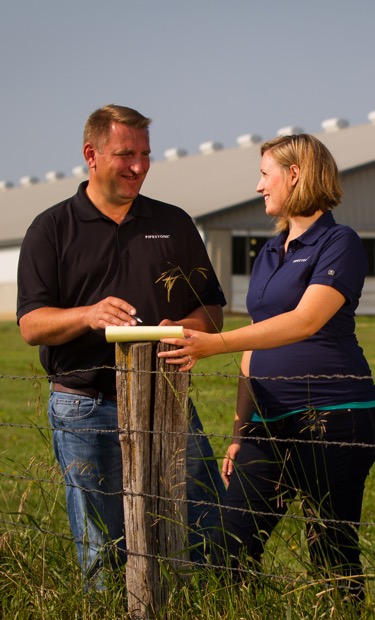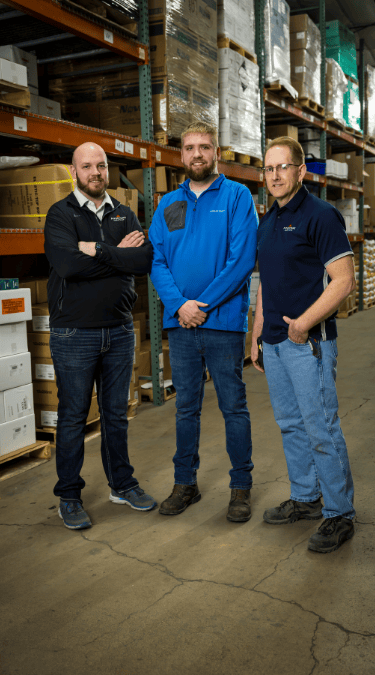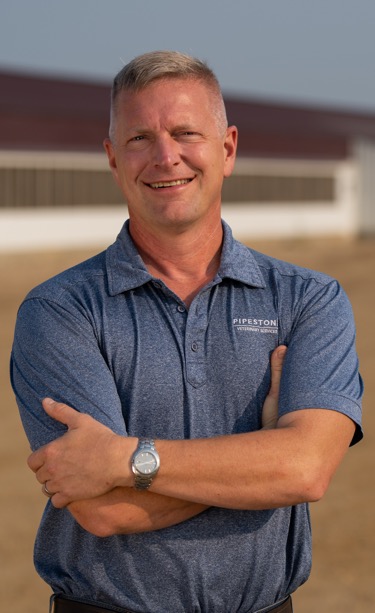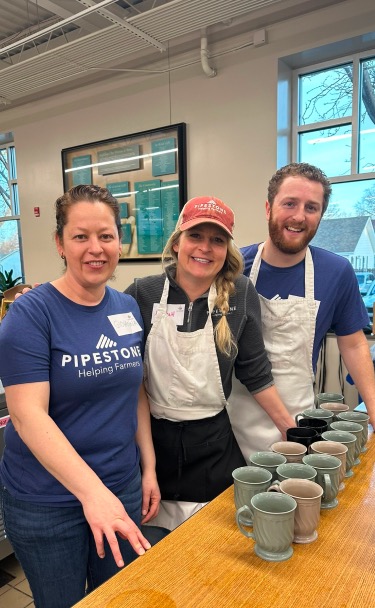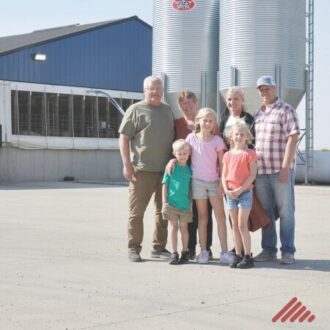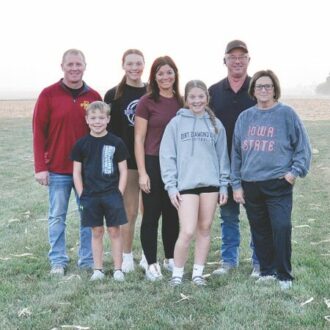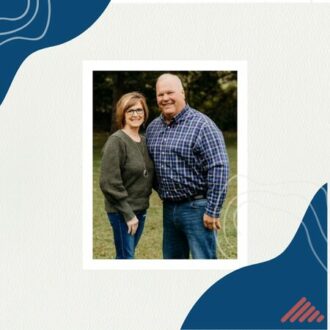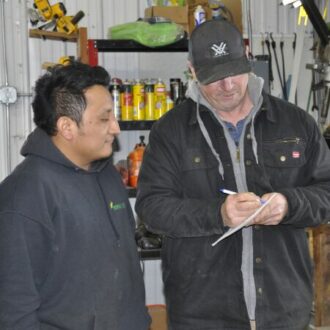Sustaining The Pig Farm of Tomorrow
The term ‘sustainability’ wears multiple hats in the world of pig farming. Today, PIPESTONE covers pigs, people and planet under that hat. Greenway Farms, located west of Mitchell, SD, recognizes these aspects of pig farming, and actively works to increase efficiency in each.
Greenway Farms is owned and operated by Brad and Peggy Greenway, their son, Brent, and business partner, Thomas Smith. They have a diversified crop and livestock farm with corn, soybeans, wheat, alfalfa, beef cattle and pigs. Their dedication to farming can be found in their pigs’ welfare, their community involvement, and their continuous improvement to the land they farm.
“Back when Peggy and I started farming, sustainability meant, how do we grow our operation and have enough income to raise a family. Sustainability going forward is going to be, how do we present ourselves and position our farm for the next generation,” said Brad.
The Greenways have two wean-to-finish barns and lease one, all stocked from PIPESTONE managed sow farms. Having ownership at the sow farm level is one way they are able to make their operation more sustainable and integrated.
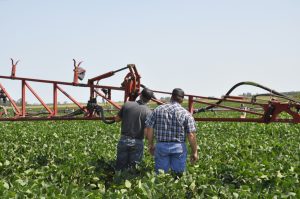 “We wanted to do something better for our animals and expand our operation. That’s when we became involved with PIPESTONE and built our first 2,400 head wean to finish barn. Following that, we put up a feed mill so we can use our own corn and feedstuffs. About 7 years ago, we built our second barn and we also lease one. We continue to grow and expand our pig farm; it’s what we’re truly passionate about and it’s been a benefit to our farming operation,” Brad said.
“We wanted to do something better for our animals and expand our operation. That’s when we became involved with PIPESTONE and built our first 2,400 head wean to finish barn. Following that, we put up a feed mill so we can use our own corn and feedstuffs. About 7 years ago, we built our second barn and we also lease one. We continue to grow and expand our pig farm; it’s what we’re truly passionate about and it’s been a benefit to our farming operation,” Brad said.
Their crop operation goes hand in hand with the sustainability efforts they have on the farm. They are able to integrate the crops they produce right back into their pig feed to help reduce inputs and have more control over the final product.
“The cool part about raising pigs is you see it come full circle,” Thomas said. “The process can start anywhere from the pigs to the manure to the crops. We’re using all the resources to produce either crops or pork in the end.”
Using their pig manure as fertilizer has helped the Greenways take sustainability to the next level. Protecting and preserving the land that has been in their family for nearly 100 years is a big factor in sustaining the farm for the next generation.
“When people talk about the emissions from the animals, manure is a big factor in that. On our farm, whatever we’re applying on land is exactly what the land Our Customers needs,” said Brent. “We do soil testing, making sure we’re meeting the needs of the ground and the crops we put in it. We also apply at the correct rates, not exceeding, or it’s a waste of a good input and not good for the ground.” The dynamic at Greenway Farms is a collaborative effort from everyone involved. Decisions are made as a team in order to sustain the farm and maintain transparency. Hannah Walkes, President of Pipestone Veterinary Services, has been working with the Greenways for many years. She shares, “We focus mostly on land practices and resource use when we think and talk about sustainability. I think one less focused area, but equally important, is the ability for the farm to sustain the next generation… And the next, and so on. Having it last almost 100 years, as the Greenways have done, is a huge feat, but carries a responsibility to continue. In every discussion, it’s always discussed how things we are doing can improve the operation for Brent and Thomas, and their kids potentially someday. Brad and Peggy have been deliberate in transitioning decision making to those two early on to help empower and start the process. I think that level of thought for the next gen is unique.”
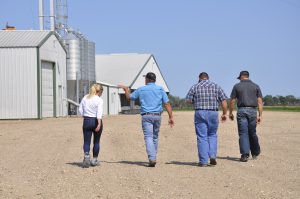 Success on the farm is only half of what makes the Greenways great stewards. Informing consumers about the healthy, safe food supply chain is something they have always taken great pride in. They do a lot to educate others about what they do on their pig farm.
Success on the farm is only half of what makes the Greenways great stewards. Informing consumers about the healthy, safe food supply chain is something they have always taken great pride in. They do a lot to educate others about what they do on their pig farm.
“Food safety is a priority for us. I want other mothers to know that the pork they buy at the grocery store that farmers like us produce is safe because we follow the rules to make sure we provide a safe food supply,” Peggy explained.
Transparency into pig farms isn’t always easy, but an important way to show pork consumers how their food is raised and cared for. The connection between farmer and consumer can always grow stronger.
“There’s only 2% of the U.S. population that does what we do every day, so it’s our role to use different avenues and just talk about what we do, because people are interested,” Brad said. “Consumers want to connect with food. They want to know where it comes from, and they have every right to do that. It’s our job to let them know what we do on the farm every day.”
A lot of people don’t understand that most farms are still run by families. Even though sizes of farms have changed over the years, we’re all still family farmers.
PIPESTONE Sustainable farms are more important than ever. PIPESTONE is committed to working with farm families to track the metrics of their farm and improve every day. Starting to track data is the first and most important step to making a change.
“Tracking the first couple years isn’t about getting to a certain number; it’s saying, ‘Hey, this is where we’re at.’ If you don’t know where you’re at, you don’t know where you need to be and where you’re going. Different lighting, different settings in ventilation, it all ties back to sustainability,” said Brent.
The future of farming revolves around sustainability and bettering our pigs, people and planet.
“There’s no doubt agriculture and food production have an impact on our environment. As farmers, we are committed to trying to reduce that impact every year,” Peggy said. “I believe we are constantly trying to reduce our environmental impact and I feel good about that. There’s something about working cooperatively with other farms, and the leadership of PIPESTONE that gives us that competitive advantage.”
If there is one thing to learn from the Greenways, it is how to dedicate everyday decisions to how they will impact the future sustainability of the farm. The choices farmers make every day contribute to our farming story and how we communicate that to the public.
Brent shares, “To me, the end goal of sustainability is to be better tomorrow than what you were today, and to do better today than you were yesterday. It’s constant improvement to reduce the number of resources you’re using to get the same amount of product.”
